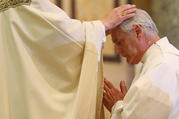Click here if you don’t see subscription options





Culture of Absence
As one who has spent 10 years of his academic life in Germany, I simply could not relate to the essay by James Youniss, I Know It When I See It, (7/4). Such public policies as universal health care, efficient rail transportation, easy access to high culture, Saturday-Sunday closing laws and cradle-to-grave financial security may be compatible with Christian social teaching, but to suggest that they are inspired or motivated today by distinctive Christian commitments ignores public opinion polls and other empirical evidence of contemporary Germany’s loss of faith. Germans today would insist that these and related social programs are rooted in secular values associated with their country’s social democratic tradition.
Christian influences, particularly Catholic natural law teaching, were strongly represented in postwar West Germany, but with increasing secularization these influences have virtually disappeared from the nation’s public life. Two examples may suffice. German constitutional law, like the nation’s intellectual culture, has grown increasingly positivistic over the years. The same is true of German politics. The Christian Democratic Union (C.D.U.), founded explicitly on Christian principles in 1946, has lost its raison d’etre, while its main competitor, the Social Democratic Party (S.P.D.), is well known for its history of militant secularism.
During the Weimar Republic and in the early years of the Federal Republic, a vibrant Catholic intellectual tradition, centered on the church’s social teaching, flourished in Germany, but no equivalent of this exists today. Christian scholarship in the social sciences is notable for its relative absence. Religious studies, mainly the products of theological faculties, have little resonance in the larger society. Yet literary attacks on Christian belief and piety, such as The Da Vinci Code, seem never to leave the best-seller lists. Secularthat is, non-Christianvalues seem clearly regnant in Germany, the predominance of which has been extended and deepened by the nation’s reunification.
Pope Benedict XVI, a native of Germany, has often agonized over his country’s loss of faith. In book-length interviews with Peter SeewaldSalt of the Earth (1997) and God and the World (2002)the then-Cardinal Ratzinger repeatedly spoke of Germany’s increasingly de-Chistianized society and a public culture characterized by the absence of transcendence. In one of these interviews he observed with regret that only eight percent of the people in Magdeburg [an East German city] are Christians, and that was probably a generous estimate because, as sociological studies have disclosed, even the memory of Christ has almost totally disappeared among East Germans, particularly the young. Finally, and interestingly, Ratzinger makes no mention in these interviews of the connection between Christianity and the comforts, satisfactions or rewards of living in present-day Germany.
Donald P. Kommers





